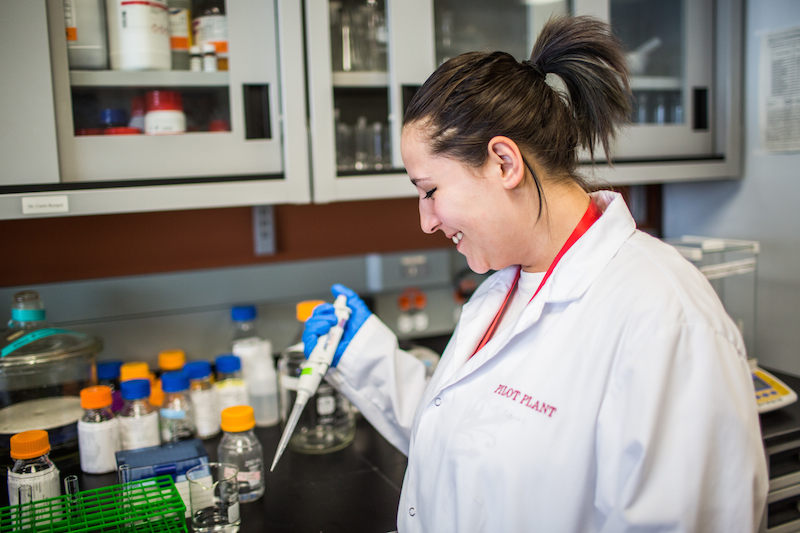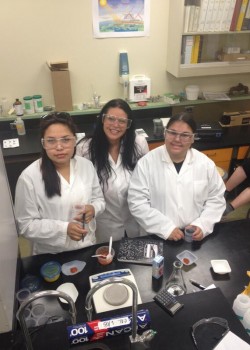
The biggest year yet for aspiring Indigenous science students
UM partners with renowned science education program to inspire students from across Canada
Until May 30th, 34 Indigenous high school students from New Brunswick to British Columbia will experience the thrill of exploratory research first-hand on the U of M campus.
It’s part of the Verna J. Kirkness Science and Engineering Education Program, and this year is the largest participation to date. The program aims to increase the number of Indigenous students graduating from science and engineering programs in Canada.
For the third year in a row, students representing First Nations, Metis and Inuit communities will arrive to the U of M to be mentored by trailblazing professors. They are coming from New Brunswick, Manitoba, Saskatchewan, Alberta and British Columbia.
U of M professors and their graduate students will guide the high school students as they experience the inspiring wonder that comes with investigating the natural world through scientific inquiry. The participants will stay in residence while visiting the U of M, further immersing themselves in the university’s exciting culture and campus lifestyle. Follow the students here.
To wrap up the week, a feast will be held on Thursday, May 29 at St. John’s College. Eric Robinson, Minister for Aboriginal and Northern Affairs, will attend and speak to the students. The Minister will be joined by Dr. Verna J. Kirkness, Honorary Chair of the Verna J. Kirkness Foundation, who will be presenting certificates of completion to each of the students.
An Honorary Degree recipient (2008) as well as a distinguished alumna of the University of Manitoba, Dr. Kirkness graduated from the University of Manitoba in 1980 with a Master’s in Education after she completed her BA and BEd at the U of M as well. She is a member of the Fisher River Cree Nation, and a member of the Order of Manitoba and Order of Canada. She is a national leader in education in Canada who has inspired countless students and educators in both Aboriginal and non- Aboriginal communities.
Indigenous Achievement, Office of the President is a sponsor of the event and twelve faculty members are hosting the students in their laboratories.
The following faculty members, their department and a brief description of the research project that they have developed for students follows.
2014 Program
Dr. Rotimi Aluko, Professor, Department of Human Nutritional Sciences
Students will learn how to extract bioactive peptides that have the potential to be new medicines from plant proteins such peas, flax seed and hemp seed.
Dr. Nancy Ames, Adjunct Professor, Department of Human Nutritional Sciences
For students interested in how research is developing more nutritional foods that taste good. Students will have the opportunity to develop new recipes for traditional foods using more nutritious ingredients. For more information you can see Dr. Ames and Georgina Balfour (2012 Kirkness Program participant) on our website. It’s the first video in Program Description.
Dr. Nazim Cicek, Professor,Faculty of Engineering
Students will learn about biological waste water treatment and the recovery of nutrients like phosphorus from waste streams.
Dr. Annemieke Farenhorst, Professor/Research Chair, Department of Soil Science
For students who are interested in spending time both in a laboratory and traveling off campus to learn about soil, water and air quality. Students will do experiments that will give them an idea of what it would be like to study environmental science, agricultural science or soil science.
Dr. James Friel, Professor, Department of Human Nutritional Sciences
For students interested in learning about the importance of infant nutrition they will learn about the importance of a class of compounds called antioxidants that play a special role in human health. Our particular focus is in feeding and biology of mother’s milk. Students will participate in ongoing research with mothers and infants either in the laboratory or in the field.
Dr. Norman Halden, Dean, Clayton H. Riddell Faculty of Environment, Earth, and Resources
For students interested in conservation and management of fish stocks you will have a chance to test fish from your own community and learn about environmental factors that affect behavior and growth. At the end of the week you will have a report that you can take back and share with your fellow students and members of your community.
Dr. Witold Kinsner, Professor, Department of Electrical and Computer Engineering
For students interested in robotics, part of the project introduces the concept of a robot, and particularly the BEAM robot. It discusses the various components of a robot, as well as their interactions and constraints. It then attempts to design a small robot and implement it using inexpensive components. The objective of this part is to show that mathematics, physics, electronics, circuits, and design principles are all needed to accomplish such a task.
Dr. Juliette Mammei, Assistant Professor, Department of Physics
For the students who have always wondered about Geiger counters, radioactive material and how to see cosmic rays, this is your opportunity. Students will do a variety of experiments and build a cloud chamber that they will keep so they can show their class cosmic rays.
Dr. Michele Piercey-Normore, Professor andAssociate Dean Undergraduate, Department of Biological Sciences
For students interested in natural products from lichens, you will learn about a group of compounds called polyketides that have well known anti-microbial, anti-herbivore, and sunscreening properties. We will plan an excursion to a field site to collect and learn about these lichens in their natural environment and which lichens would be best for natural products. Then we will spend three days in the lab extracting and testing some of the products from the lichens to determine the function of the natural products.
Dr. Joannie Halas, Professor and Associate Dean (Academic), Faculty of Kinesiology and Recreation Management
For students who are interested in understanding how physical activity relates to health. You will participate in several activities in clinical and on-campus settings, with opportunities to visit up to three labs, including one that measures human movement. As a main focus, students will have opportunities to learn more about the role that physical activity can play in helping to prevent and manage diabetes in First Nation populations.
Dr. Kateryn Rochon, Assistant Professor, Department of Entomology
For students who are interested in insects, livestock pest management and tick-borne diseases. Students will collect specimens in the field for identification in the laboratory. Students will prepare a presentation that will include photographs and images of the collected specimens.
Dr. Barbara Sharanowski, Assistant Professor, Department of Entomology
For students who are interested in insects in northern communities, taxonomy, and web-based biodiversity information. Student’s will be asked to bring some insect specimens collected from in and around their community that they are interested in identifying, imaging, and writing a web-based description about. Information regarding how to collect the specimens will be provided to the students.
For more information contact Andrea Bilash, Marketing Communications Office, University of Manitoba, 204-480-1473 (andrea_bilash [at] umanitoba [dot] ca).
Research at the University of Manitoba is partially supported by funding from the Government of Canada Research Support Fund.







